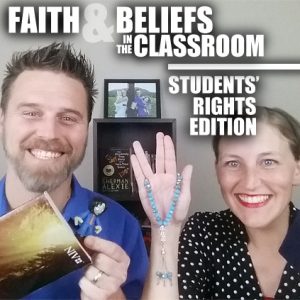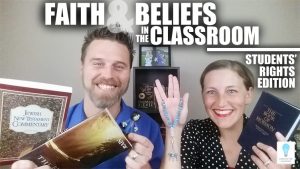Today, we’re gonna start sailing out into some tricky waters with a video series of conversations about Beliefs in the classroom. Today’s focus: What are students allowed to do?
Watch the YouTube video here >>> https://youtu.be/5fqN8ZCtyfg
Everyone has their own kind of belief system about the world. This includes religion, faith, politics, philosophy, ecology, etc. And there are a lot of feelings out there around this topic … Faith and Beliefs in the public school classroom.
- Maybe we’re confused about the laws and aren’t sure where to start.
- Maybe we want to dive in, but we’re afraid of doing it wrong and losing our jobs.
- Maybe we’re angry at teachers who try.
- Maybe we’ve kind of ignored the rules because we feel like we should be able to talk about anything we want.
- Maybe we just want to make sure all students have the right to be represented and want to know how.
We thought it’d be good to start with what the law says and get that cleared up. Parents, students, teachers, and admin all have their own rights and regulations around this but they all echo the same basic principles. Whichever of these groups you’re from (Parents … what can your child do? Students … what can you do? Or Teachers … what can your students do?), we just want to add more clarity for you around what is allowed and what isn’t.
We’ve tried to make sure we’re accurately outlining these, but please make sure you also look these up too. We’re in this with you and are always learning ourselves.
So for today, let’s zoom in on students’ rights regarding faith at school.
The 1st Amendment of the Constitution has the first solid word on this:
“Congress shall make no law respecting an establishment of religion, or prohibiting the free exercise thereof; or abridging the freedom of speech, or of the press; or the right of the people peaceably to assemble, and to petition the Government for a redress of grievances.”
This means that schools can’t make anyone practice a certain religion but also can’t prohibit the free exercise of it. Schools also cannot abridge the free speech of students.
But if students were allowed to do or say ANYTHING related to religion, then school could get a little crazy. Which brings us to the 2nd general rule:
If a school allows any student or group to exercise a right, it must allow all students or groups to exercise that right.
The last general guideline is that schools can infringe on a right if it is seriously preventing school from functioning smoothly and they must infringe on them all the same.
So let’s dive into some details.
- Students can wear religious clothing and jewelry as long as it doesn’t “interfere with the operation of the school” or isn’t lewd or obscene.
- Students can pray on their own or in self-gathered groups as long as they don’t disrupt school activities.
- Students can talk about their faith in their schoolwork, projects, artwork, as long as it accomplishes the assignment in quality ways.
- Students can invite friends to their faith-based events as long as they are respectful of other students’ space and don’t disrupt school activities.
This is where the 1st Amendment is joined up with the Equal Access Act. It says that:
“(a) public secondary schools that receive federal funds (b) “[cannot] deny equal access or a fair opportunity to, or discriminate against” (c) “any students who wish to conduct a meeting” (d) within that “limited open forum” (e) “on the basis of the religious, political, philosophical, or other content of the speech at such meetings.”
- Students can distribute printed religious material as long as they don’t significantly disrupt school activities.
- Students can post flyers or announcements in public spaces where anyone else is allowed to post non-religious content.
- Students can start any kind of club they want to and invite any outside speakers they want.
- Students can mention their faith and religious scriptures in special speeches or ceremonies like awards or graduation.
- Students can mention their faith and ask faith questions during classroom discussions and while studying novels and stories, history, science, or anything they see their faith as relevant to the learning community and isn’t disruptive.
Phewee! That was a lot. But we wanted to make sure we brought up a bunch of the different situations to help us better understand the nuances.
So … POP QUIZ TIME?
QUESTION: Who can have a club at school?
ANSWER: Anyone. That means Catholic, Jewish, Muslim, Christian, Sikh, atheist … anything. That also means Communist, Democratic, Republican, KKK, environmental, LGBTQ, or anything else similar.
As well as, of course, chess, cheer, The Walking Dead and disaster prep, robotics, etc.
QUESTION: What if the students can’t find a teacher who will supervise their group when they meet?
ANSWER: Then they can’t meet. Each group has to have a staff chaperon who will supervise the meeting for safety. We’ll get into how much they can get involved in the meeting during our Teachers’ Rights video. But if students can’t find a teacher, they can’t meet.
So that means that’s the one tricky, fudgy, gray area about whether students get to exercise this right. Because the school can’t make a teacher host a meeting during their non-teaching time. So if the KKK club can’t find a teacher willing to host their group, they can’t meet. And it seems the teachers can have plausible deniability about why they can’t volunteer to supervise a group.
Yeah, I remember at my public middle school, there was a group of students who came and asked me if they could meet for the Bible club in my room during my lunch time once a week. I said yes and basically worked the whole time and my stuff. They’d bring in pizza, different youth group leaders to lead in Bible studies or activities and such. They’d invite each other to each other’s churches and activities and work together for community-wide service events. And all I the teacher had to do was be there to supervise. But I could have said “No.”
So there you go. That’s it for Round one exploring the rights of students and how they can live out their various belief systems. Stay tuned for more videos about Teachers Rights and maybe a couple more.
Conversation of the Day: What questions do you have about students’ rights to practice their faith at their public school?
Hop on over to watch the video and share your thoughts in the conversation.











